#neoliberal utopia and all that.
Explore tagged Tumblr posts
Text
Ah fuck now I have to go on a tangent
Okay so on top of joking about Paw Patrol being a fascist state, we do also do academic analysis of the thing. Unfortunately, both children's media and copaganda are fairly new fields of study. While we don't have a lot of specifics in either field, we do know that entertainment influences our perceptions of reality, and we know that kids are particularly susceptible to this.
That's generally why we should keep a close eye on what values our kids' media represents and how well they're executed. Even a well-meaning piece of fiction could perpetuate harmful narratives (which I'm sure anyone on this hellsite has discussed at length).
And when it comes to those narratives, Paw Patrol,,, sucks. Like, it really shits the bed. (At this point we need to briefly acknowledge that Paw Patrol's primary function is to sell merch; they didn't set out to make a morally valuable children's show. Ideally it could do both, but it was never meant to.)
It does hit the surface level beats of "be nice to others" and "work as a team" and "believe in yourself" etc. As a bonus, it brings up conservation and recycling, which is nice.
Aaaaand that's where it ends. If you even marginally scrape past the surface, it gets shockingly regressive. Like, there are 7 central cast members (1 kid, 6 dogs) and only one of them is female. That's an abysmal split in gender representation for a show aimed at all audiences. Despite a roughly 1:1 split in real life children, media often opts for a 2:1 ratio of male and female characters. Paw Patrol's discrepancy is three times as high. (For the sake of comparison, that's the same ratio as in My Little Pony, which specifically targets young girls and still worse than Teenage Mutant Ninja Turtles, which is targeted at young boys.) It goes without saying that The Girl wears all pink and has an implied love interest in the main character.
But let's talk actual societal structure and lessons, because that's where it gets weird.
As mentioned above, there are no prisons in Paw Patrol. That's because generally, the town where it takes place has no crime. There are no criminals in Adventure Bay. But there is Police: Our privatized Cop Dog and central character has by far the most screen time and missions. Which is odd, when most of these missions do not require police presence. Lots of them are rescue missions, either due to accidents or natural catastrophes, and could in fact be solved through airlifting or bulldozing alone. Yet cop dog is there all the time. His main contributions to the group are leadership and high-tech gear. I shit you not, this dog has a surveillance drone. Drawing a parallel to the increased presence and militarization of police forces is really not that far-fetched.
It's important to acknowledge here that a lot of media for young children carries pro-police messaging, and I'm hesitant to call it copaganda by default, despite its explicit purpose to foster trust in the police force. The reason I hesitate is that it falls in the general category of "trustworthy adult" representation, which helps young kids navigate their world. Lessons like "If you have [problem], [authority figure] will help you" are pretty par for the course in entertainment for young kids. Cop Dog stands out because he's not a trusted adult, he's a main character. He's always there and seemingly holds authority over the other dogs, despite being technically equal.
There are some episodes that include actual crimes, which would justify police presence. This may sound contradictory to earlier when I said there were no criminals in Adventure Bay (good job paying attention, btw) but there's a very simple explanation: Crime in Paw Patrol is committed by people (and/or animals) from the outside. Yeah, that's about as obvious of a xenophobic narrative as it gets. This does go hand-in-hand with the ways we generally portray "bad people" in kids media as inherently different to the "good guys", like they have some sort of intrinsic quality (eg lack of self control) that makes them do the evil bad thing. They're evil because they're evil. When it comes to punishment, Paw Patrol (in lack of prisons) usually relies on either karmic retribution and/or labor. If your crime was to break something, you have to fix it, etc. I personally find that the least problematic part of the overall messaging, but it does obviously combine with the above "All wrongdoers are outsiders" thing.
Quickfire round: Elected Officials are all portrayed as incompetent. In fairness, there are only two of them, but one of them is the recurring antagonist mayor of the neighboring town and the sympathetic mayor of Adventure Town itself is often frantic and helpless; after all she needs to contract a private organization to resolve pretty much any problem in her town. She also happens to be a black woman, so make of that what you will.
Even though the government doesn't provide seemingly any services to its town, it remains a 'neoliberal utopia' thanks to the entirely privatized services of our main characters. That's technically a massive systemic failure as Adventure Bay would collapse as soon as the dogs take their business elsewhere, but I do not think flawed public infrastructure is what's gonna harm your toddlers mind. You can make a point about how it fosters trust in private entities vs public ones, but I think that requires more critical thinking than the average Paw Patrol viewer supplies.
There were a couple of more or less infamous publications scrutinizing Paw Patrol in early 2020 (you may recall the whole "The woke left wants to cancel Paw Patrol" nonsense), but in general even the strongly worded academic papers that compare Cop Dogs spy gear to the Iraq war aren't taking it too seriously.
As an example, I leave you with “Whenever there’s trouble, just yelp for help”: Crime, conservation, and corporatization in Paw Patrol by Liam Kennedy.

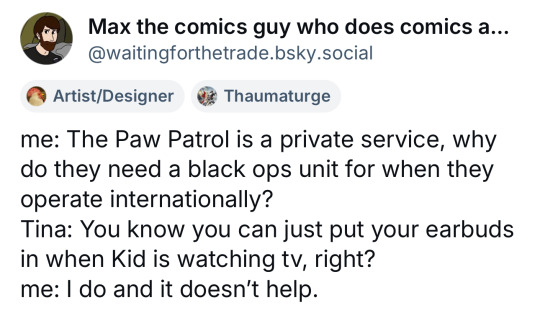
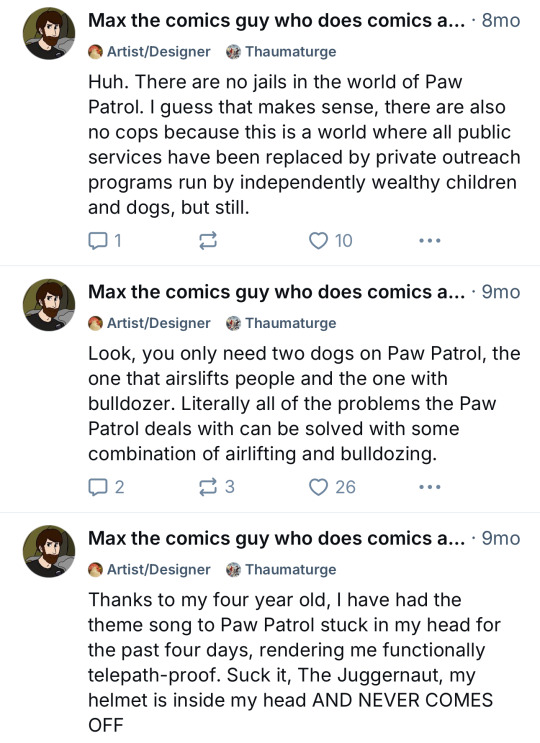
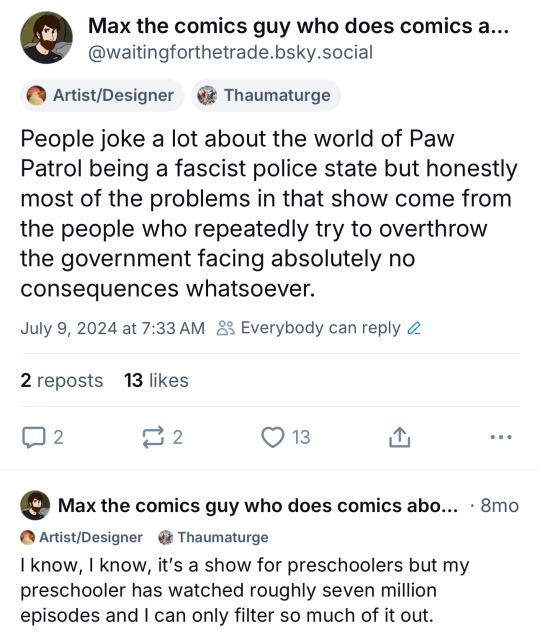
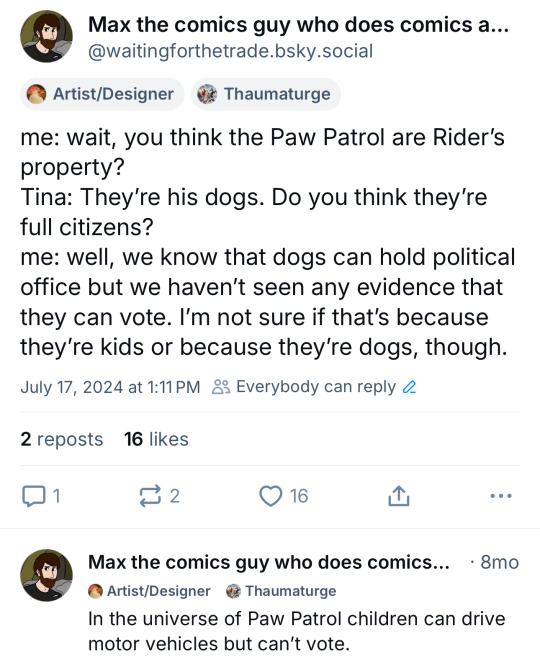
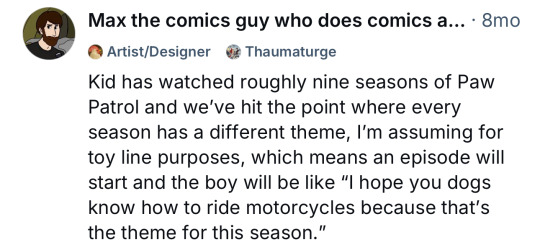

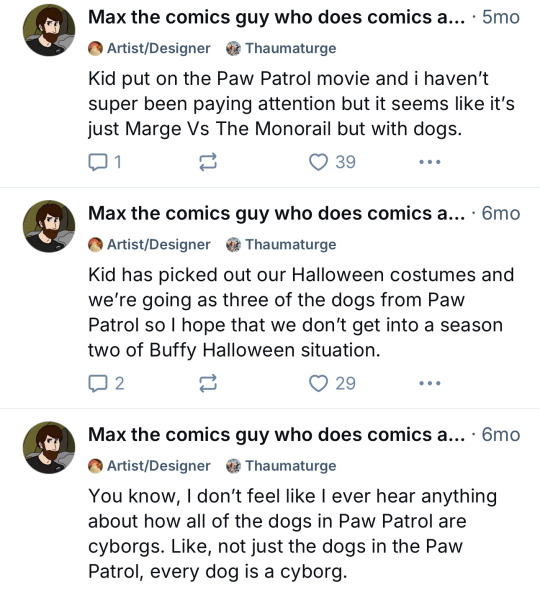
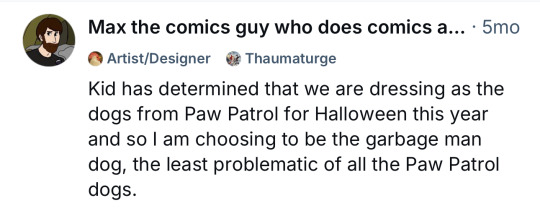
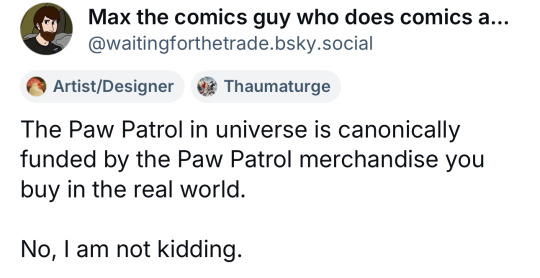
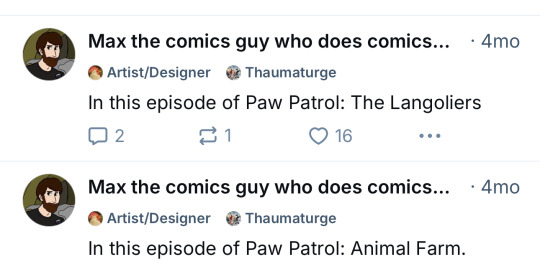
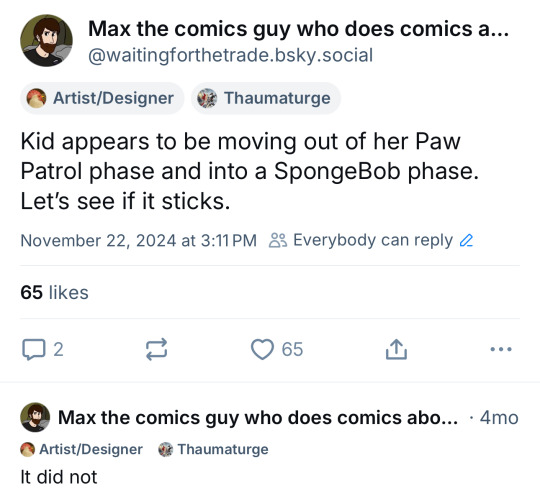


My journey thru my kid’s Paw Patrol phase via posts from my Bluesky account.
#ramble#long post#ah the good old days of me dumping a bunch of info on some poor unsuspecting tumblr user#and im still doing it in order to procrastinate my bachelors thesis which would be on the topic of copaganda#i did specifically do a prep assignment on paw patrol tho. hence... all this.#fun fact ive never actually seen an episode of the show#and i am keeping it that way#the gender split bugs me an unreasonable amount. like theyre dogs. there was nothing stopping you from making two girls#if anything i feel like that wouldve increased merch sales?#but what do i know. this show is like crack for toddlers so clearly theyre doing something right#didnt even talk about the recycling part but its all very “if you do your part it will all work out because we can trust big corps”#neoliberal utopia and all that.#but to be fair “you can affect change” and individual power is a huge theme in kids media to teach em about responsibility#similarly theres a lot of “untrustworthy authority” in media for older kids. its how we plug the “why dont they tell [x]” plothole#anyway i refuse to add any actual helpful tags to this. the end.
4K notes
·
View notes
Text

this a view of someone who's ignored european developments since 2007, opting for a rosy, outdated view of european politics, i.e. the exact type of american committing the exact type of mistake i'm warning about.

to address this point by point: not only has inflation been a global issue, but the US has consistently enjoyed the lowest inflation of any developed economy. american CPI has remained below the british, polish, and eurozone average numbers. european economies have to deal with fallout from the russian invasion of ukraine that the us can ignore: notably, in energy prices, as the US became self-sufficient in energy (and never imported any from russia to begin with, something squeezing the german economy). america is also not hosting millions of ukrainian refugees.
when discussing european instutions—and "europe" in general—one has to be more specific. do you mean the overarching institutions of the EU, criticized for a democratic deficit that many have pinpointed as one source for euro-skepticism and the rise of the far right? the EU Council, widely ignored and headed by charles michel, an incompetent, blatant nepobaby appointment whom everyone grinds their teeth over? the EU parliament, recently filled with a fresh batch of far-right hooligans, which functions more or less as a rubber stamp for the commission? the EU commission itself, headed by VdL, the latest in a string of failed local politician commissioners (who remembers the alcoholic swindler juncker?) masquerading as technocrats? the ECB, which smothers the monetary (and through the maastricht criteria, the fiscal) policy of eurozone members, thereby fueling resentment, far-right movements, and economic disparity? and all of this held hostage by the veto of one orban or fico, —or the german supreme court, when it decides it's had enough with public investment. those institutions, which remain so opaque that even educated americans—and europeans—aren't entirely aware of their function?
or do we mean the institutions of individual countries, ranging from undemocratic autocracies like hungary to the fief of the jupiter king, who called elections in june, lost them, refused to nominate a prime minister from the winning coalition, didn't name any for over a month, and then appointed a rightwing politician from a party that scored dead last, sidestepping his own centrist party? the UK, where sir keir is handing out five years in jail time to climate protesters, raising tuition fees, relying on private investment companies, and through rachel reeves' plan to fix the alleged budget hole left by hunt before further investment, again enacting austerity? this is all front-page headline news from the last half year.
european countries indeed have cheaper healthcare costs, better pensions, and other public goods that the united states does not. when considering "quality of life," remember, however, that most european countries have unemployment rates considered astronomic in america, especially for under-35s:

to focus again and again on european social democracy is to ignore that it has been steadily eroded since the end of the cold war and especially since the great recession by neoliberal political forces that crush the left and open the door for the far right. in the most blatant example, beside's macron's legislative politricks, the IMF-ECB-EC troika cut off euro cash liquidity flow to greece when syriza was trying to undo austerity under varoufakis. the greek collapse consigned a generation to economic failure, killed seniors, and curtailed possibilities for the youth. this erosion happened even in the nordic model, long imagined by americans as nothing short of a utopia:
In part due to the scrapping of wealth and inheritance taxes and a lower corporate tax than both the U.S. and European averages, Sweden has one of the most unequal distributions of wealth in the world today: on a level with Bahrain and Oman, and worse than the United States. Perhaps most dispiriting for Sanders, Sweden also now hosts the highest proportion of billionaires per capita in the world. Many of the country’s trademark social services are now provided by private firms. Its private schools even benefit from the same level of state subsidy as public schools—a voucher system far more radical than anything in the United States and that Democratic politicians would be crucified for advocating. Both here and there, right-leaning commentators in 2020 decried Sanders’s portrait as little more than what Johan Norberg, Swedish author of The Capitalist Manifesto, has called a 1970s “pipedream.” On this, Swedish observers on the left gloomily agree: despite official rhetoric, the “Nordic welfare model” is now more nostalgic myth than reality. (x)
to problematize further, there's an unadressed first world perspective: who's getting the good quality of life, why are the main economies of the EU so wealthy, and how does the EU continue to enrich itself? there are certainly many living outdoors today, drowning in the mediterranean, or dying of exposure in białowieża. fortress europe is a crime against humanity—and it doesn't beat back the far right. it weakens civic and human rights, undermines legal oversight, and criminalizes humanitarian engagement, allowing an authoritarian creep.
you shouldn't understand the political and the historical as a snapshot in time, but as a moving train. this is the state of europe today. all of the above is necessarily a simplification and an abbreviation, but there's a trajectory you can begin to trace out: given all of the above, where do you think europe is headed?
#sorry that the US and Poland are the same shade of pink in the CPI chart i couldn't change it#please stop idealizing europe's political trajectory. it's 2024. you've got to stop.#i'm not trying to insult or condescend the person who left this but to shed light on what are extremely obvious issues mystified#by a decades-old mirage of europe still trapping hordes of well-meaning americans who ought to know better#if tugoslavija were here...
191 notes
·
View notes
Text
"If voting was worthless they wouldn't be trying to make it harder."
"If voting worked they'd make it illegal."
Okay these are both fun slogans but let's talk about what really happened here in the US.
First they made it so only white landowning men could vote. Then over the years other groups of people kept fighting for the right to vote and winning and the white landowning men were like "fuck well we can't defeat the masses outright on this so we'll just make a bunch of rules that make it hard for them to vote." And the oppressed masses fought against those too and won a bunch of gains on the issue like the Civil Rights Act.
So the powerful learned from their mistakes and made other, more subtle rules to make it harder to vote as the two parties battled back and forth to win the most power and influence and corporate donor money.
Republicans fought by making it as hard as possible to vote because they tend to win when less people vote, and especially when only the privileged with a lot of money and free time can manage it.
Democrats fought by trying to get more people to vote, but it's a bit more complicated than that. They're still beholden to wealthy corporate donors, so they can't just let pure democracy happen. They can't let real leftists become presidential nominees or allow real leftist policy like universal healthcare to pass. What they can do is convince you over and over to vote for the "reasonable" option under threat of Republican Hell so that you not only give them more power, but hand over your money and your time/energy to convince other people to give them more power and money.
Republicans benefit from the same kind of threat to their constituents, even as they're more blatant in their fight to stop people from voting.
The result is a system in which both the statements at the top of this post are true. If our voting system threatened to turn the US into a socialist utopia where the masses had all the power, they'd make it illegal. Democrats have never made a serious move to abolish the Electoral College. They absolutely mobilized to prevent even Bernie from becoming the Dem nominee. They'd do it again.
And you can see the same patterns in similar nations. Labor gained power in the UK only to become an anti-labor neoliberal party practically overnight. France elected a leftist government and Macron just went "nope."
But they're never going to make voting all the way illegal for just landowning men again, let alone make it outright illegal, because they know that would inspire the masses to rise up and make too much trouble again, and who knows what they'd lose? The current situation is working out great for them.
Meanwhile, of course Republicans want to make voting a certain amount of hard because they do want the most power, but even Trump probably knows better than to outlaw voting. At most he'd turn the US into a sham democracy like his idol Putin.
Which would of course suck, but the point it that the two statements up top are both essentially true but reductive.
Voting isn't worthless but those in power are never going to let us vote our was into a society that removes or even significantly reduces their power. You can maybe make things temporarily a little better or prevent them from getting worse for some people by voting.
But the problem is that people aren't just voting. They're voting and then telling themselves that they did their duty and using that as an excuse to do nothing else. Or they're voting and donating millions to Kamala in mere hours while GFMs for Palestinians and other desperate people stagnate. Or they're voting and giving all their attention, energy, and time to the two big party presidential candidates by volunteering or yelling at people on social media or both so all the money and power is funneled back into those who already have nearly all of it.
And nothing is left to actually fight for a better world.
I don't care to tell people whether to vote or how. It feels to me like a choice between a fast death or a slow one, which sucks either way. What pisses me off is that we're letting the powerful convince us to invest so much in them with this perpetual election season as the world circles the drain, and the most powerful know full well that this leaves us with too few resources to ever topple them from their thrones.
You're letting them pull your strings instead of breaking them. Things get worse every year and the longer we do this, the worse it's going to be for us all, and worse still for future generations. How long are you going to fight to slow down the train that's headed for the cliff instead of jumping off it while there's still time?
Don't scold me about voting on behalf of the train conductors hoarding all the train food. It's not a perfect metaphor ok but the point is fuck off and fuck this.
80 notes
·
View notes
Note
it's wild that the lancer is genuinely meant to be utopian. like portraying union as good is really funny when. as written they're kind of a fangless neoliberal puppet with just enough power to mediate interactions between a handful of massive cartoonishly evil corpo-states. half of all mechs flavor text is about a specific horrible thing one of the corpo-states did. but it's OK it's a utopia in progress.
literally! and people will say to me over and over again "oh you'r'e missing the point, the whole point is that the utopia still has bad stuff because you have to keep fighting to get rid of the bad stuff even after your revolution" and its like. by all metrics i can imagine union is not only 'not a utopia yet' it is, like, meaningfully more dystopian than a lot of real-world societies. it really is just a lesson in the failures of the liberal imagination
151 notes
·
View notes
Text
i think everything in this world has a responsibility to do better
"relax, it's a children's show, who cares if it's racist?" — the nonwhite kids who are going to see themselves in there and internalize that racism. their white peers who are going to find the abuse their peers endure enabled and replicate it.
"is there a wrong way to vote? do you believe there are more valid votes than others?" — yes to both, actually, if a society elects a neoliberal leech like in my country then it's a symptom of the decline of the representative power of democracy. We have a right and a responsibility to demand more education, more history, an aware population, and clean elections that don't result in the third power governing de facto while the second power is bought off.
"art is messy, and you can separate the art from the artist" — absolutely, but in case you're unaware, art isn't a reflection of society but an actor in change, a performative force, a building block in the regime of what is possible. Artists whose work ends up reinforcing oppression don't get to say "it wasn't my intention". Umberto Eco and Roland Barthes already said it. Your art's power shouldn't suffer that diminishing phrase. It's more than you, it will always be, so you'd better make sure to check your biases before it's out of your hands.
Of course, we can't all be making art that proposes better worlds. We can't all have a Freirean sort of utopia in mind to mark our path and direct our actions. Some of us just make art, right? I'd just like for that art to not further oppression worldwide, but what can we do?
The literal bare minimum: don't back away in the face of the path your work has traveled down. You may have to disown or defend it. You may have to polish it and fix it so the decisions you took aren't simple implicit societal mandates; but well-thought design elements that drive your point across using the only thing that's exclusive to the arts: poetic language.
17 notes
·
View notes
Text
sensitivity readers and the privatization of morality
neoliberal politicians are typified by wanting to privatize everything. because neoliberal ideology aims to bring every aspect of being human into the realm of the market, morality is increasingly privatized. sensitivity readers are an example of morality being privatized in two ways: one, by the reader commodifying their marginalized identity to sell their ability to make sure a work isn't problematic and two, by the author involving a financial transaction in the evaluation of their morality. i don't think finding people to advise on topics related to marginalized identities is a bad thing at all, but i caution against doing so without recognizing the underlying neoliberal logic and trying to imagine ways to build a world where this problem can be solved without a privatization mindset.
first, what is a sensitivity reader? this is a person of one or more marginalized groups who offers to read over written content produced by writers to check that it does not have any problems in depicting that marginalized group. for example, an author who has no idea what it's like to use a wheelchair as part of daily life, but wants to include a character who uses one, can find a sensitivity reader who has the same experience and can look over the manuscript for inaccuracies and unintentionally offensive errors, etc. sensitivity readers are used even by major publishers, but can also be found in small writing communities.
i don't think this is a bad solution to the immediate problem facing authors and other producers of written content who want assurance that their depiction of a marginalized group is respectful and accurate. these types of advisors have been around before the modern era of social justice activism—plenty of movies have hired cultural advisors for example. what i think is odd, and a glimpse of neoliberal logic infiltrating a left milieu, is the uncritical acceptance and promotion of this type of transaction.
i always like to consider: how would i like this problem to be solved in my future utopia? first, no one would feel obligated to commodify their ability to edit a work from the perspective of their identity. that by itself is incredibly neoliberal logic. but also, both parties could approach it less like the advisor was presenting a moral hoop for them to jump through, and more like they are an expert providing information regarding a major topic featured in the work. it might be a painful or emotional or personal topic, but the priority would not be the author's moral purity but the sensitivity and accuracy of the depiction (if the primary intent is to make sure members of that marginalized group can engage with the work and feel respected, the work itself rather than the author's moral purity should be the priority).
in a better world, this could be one of many conversations that helps people understand each other without the shadow of a financial transaction hanging over it. instead, we have commodified this thread of human connection into something that can be transacted. even the name "sensitivity reader" instead of "cultural consultant" or "research advisor" indicates that some kind of moral evaluation is happening and that the relationship is between the reader and the text and not the two people.
again, given the world we currently live in, i don't blame people for going this route. being a sensitivity reader might be a valuable extra chunk of income for some and hiring a sensitivity reader might lessen the anxiety of authors participating in communities that are less forgiving than one might hope. in practice it is not really that different from hiring any other subject expert to ensure accuracy. but i do think it's important to recognize areas of human experience which are being brought into the realm of the market without our noticing, and this is one. one of the biggest dangers of neoliberalism is not just policies we can read about in the news, but the insidious change of mindset it inculcates in subjects. if we just accept that hiring a sensitivity reader is a thing without examining why, it closes off our ability to recognize what's, well, neoliberal, about it and imagine a better way to solve problems.
PS: if you find my writing interesting or educational, please reblog! like artists, writers depend on reblogs to make sure new audiences see their work. thanks for reading!
#privatization#neoliberal capitalism#neoliberalism#writeblr#writerscommunity#writers on tumblr#writing#social justice#my writing
10 notes
·
View notes
Text
Keeping one's own values untouched in this wretched, bigoted, disgusting neoliberal hellscape, is a feat worthy of endless loot and treasure.
I have this story to show what i mean, it's a work in progress, about Michael, a young man who just finished getting his 17th PhD in an ivy league university, with a bright future ahead of him, and countless job opportunities being sent his way (including working on high positions in government!)...
He decides to confront his parents and tell them that he quits, this wasn't really him all along, and he wants to move back into their basement, play videogames, and do a part-time burger flipping job at the local Burger King...it gets HEATED but they accept his choice and support him, the story is about the repeated attempts of his former colleagues and professors and superiors to bring him back to the academy, to finish his work on Cold Fusion for example "no one else can do it but you! It could bring humanity into a new era of prosperity! Please, work your magic this one time!" "...naaaaaah"
Or his former philosophy professor goes "your unfinished book may hold the key to bridging the subject-object divide and solve objective morality, this would mark a before and after for MANKIND!!" "Nah i am trying not to think too hard as of late"
Or he gets harrassed by a wealthy tycoon "fifteen million dollars cash, no strings attached, and fifteen more after you finish your work on reconciling Marxism and Objectivism. I beg of you, once i read your projects on the subject, i had a dream of a utopia, where everyone prospers yet no one is used as a slave in any way, it was heaven, do it for me, for everyone Michael-" "pass" "but you must do this! I'll even double the offer, and i'll invest whatever you need, do you want your own private island?" "Bruh i said pass"
Or his super genius ex girlfriend from university harrasses him even harder "Look what you've become, disgusting slob! And yet, i need you to help me, desperately so, if you find some interest in the depths of your soul to lend a helping hand, please finish your work on quantum mechanics! You were one step away from the Unified Theory!" "Yeaaaah, i am sort of over you, i don't think i like women that way...anymore...or at all" and the ex gets really mad and toxic, then Michael reveals he's sort of into men...in a non-gay way? And she storms out, like most guests in this story, fuming, grumbling and cursing under their breath.
It continues by having Michael come out as a straight trans woman to her parents, she's named Minerva now :3
And she has things going on in her burger flipping job too, like this transphobic former professor of hers, he goes in all like "hello ma...maaan? Womaaan?" And she's like "woman" "ok Michael Jackson...wait are you Michael?! The prodigy with 17 PhDs?!" "Used to be, that's not who i am anymore, what's your ord-" "i see you are one of those gender confused attack helicopter pansexual furries with funky pronouns" "(sighs) what's your order?" And it escalates with the guy proposing some research projects he needs a sharp male mind for, she turns them all down and ends up serving him a whopper with extra cheese. She also gets this scene where her coworkers see her banger ass home, the basement stacked with piles of pizza boxes and videogame cases, and they find the 17 PhDs framed on the walls of her parents' bedroom, and it becomes very silly. Long story short, she ends up wearing a cute skirt to work and she passes now :3.
Then, just after she dealt with some old university colleague bothering her with a desperate offer to develop perpetual movement machines, she gets comforted by this really nice handsome coworker of hers, they end up dating, he's named Joey and he's a riot as well. The story is still in progress, anything any of y'all want to add/change? Love and kisses :3
#story#transfem#lgbt pride#funny#:3#anti capitalism#anti success#low expectations#original character#original story#fiction#straight pride#trans woman#lazy#videogames#video games#catgirl#she is so into fatty foods as well#fatty#basement#living life#true purpose in life#giving up#peer pressure#transgender#lgbtq community#lgbt#socialism#degeneracy#fast food
13 notes
·
View notes
Text
I know it's probably not even close to accurate, but I can't stop myself from thinking from time to time that we could have all been living in a fully automated gay space luxury communism solarpunk utopia if neoliberals hadn't fought to hide the impact of fossil fuels on the climate and run fearmongering propaganda against marginalized communities to keep us bickering and to keep the prevailing wage lower than the cost of inner city parking spaces, all for the glorious accomplishment of having trillionaires in our lifetime.
Like we're just now seeing automated fast food joints and humanoid robots doing menial labor and self-driving vehicles (which will still be less efficient than communal kitchens, distribution sites developed outside of the form factor requirements of human labor, and well-developed public transit that's hamstrung at every turn by Big Auto but works in literally every other developed country just fine today) because the projected costs of implementation for all that are finally dropping below the paltry $7.25 an hour paid out to like half the country, because service jobs are the one thing that couldn't be outsourced to jack up the stock price, and there's a voice in the back of my head that says "we could have had all this and then some decades ago if the point of cutting human labor out wasn't to drive costs down, but to provide as many people as possible with a comfortable life."
It honest-to-god sickens me that we reached this point off the lifeblood of people around the world who, staring down the barrel of a global hegemon, had no other choice but to work themselves to death for shit-fifty an hour - that we crossed this cost-benefit analysis line not by the rising of wages to sustain a living, but by the fall of development costs in the wake of hypercapitalist productivity, to the point that big business can safely and comfortably yank the rug out from people scraping by on poverty wages without excessive setbacks to profits. And of course, unlike the optimistic predictions of the retrofuturistic PSAs of the 50's, it's not like anybody but the ultrawealthy who already own everything will benefit from zeroing their labor costs. And with no money left to buy the useless plastic shit that's cooking the globe on its way from factories to warehouses to landfills, everyone else gets hung out to dry as the world burns. Out-fucking-standing.
I hate to feel angry and defeated, so I'd like to channel it into something positive. I'm throwing some union links out here. Get in contact and learn how to unite your coworkers who are upset about the cost of living - you stand a far better chance of uniting them under that umbrella than anything else, and it'll be a lot more effective than just choosing the lesser of two evils every four years.
United Food & Commercial Workers
Teamsters
Service Employees International Union
Industrial Workers of the World
6 notes
·
View notes
Note
I do wish a lot of white leftists/communists, for all the time they spend condescending about people not agreeing with them or being far left enough, would take a moment and understand that they're alienating a lot of older POC/immigrants. My dad is from a country that embraced some socialist ideas and they quickly turned into a lot of issues the country still hasn't recovered from (I don't know if it's the result of those socialist ideas, but there is a very real fear regardless), and I imagine a lot of older people who have immigrated here from places like that feel similarly. It's really easy for people who've never had those experiences to look down upon the idea that Bernie or AOC could be radical in any way, but the combination of the way the GOP frames what they're doing and the refusal to compromise on language that feels extreme (but usually isn't, I know, this is just what I've been told by my dad and others who share his views), is a really dangerous one.
My dad found Bernie off-putting because of all the media stuff about how radical he was (which, again, he isn't to most leftists/communists/whatever, but the fact of the matter isn't really the point). Trying to push so far to the left, while may feel like common sense to them, really isn't the magical solution they think it is. Whether they agree with this older generation of immigrants or not, the fear these people have is very real, and I think the refusal to acknowledge it will hurt us significantly.
And it feels really harmful and racist for white young people who were born and raised in the US to look down on these people or call them bootlickers or neoliberals when they have reasonable doubts and trauma backing why idealistic futures of communism or socialism are terrifying.
I mean, yeah. That's pretty much exactly what I've been saying all along, in various posts/rants. Because young white leftist-identified Americans have no experience of living under old-school twentieth-century communism, it's a "grass must be greener on the other side" situation where they figure that it must obviously fix all the problems with late-stage capitalism and be a perfect desirable utopia. When people who actually lived through those regimes (or indeed, long-suffering local historians) try to tell them otherwise, they're scoffed off as being Insufficiently Committed To The Revolution and/or not understanding what it "really" means, all the while as they make absolutely no attempt to educate what they DO mean. Not least, one suspects, because they have absolutely no idea themselves, and because social media, with its insistence on totally binarized, black-and-white, us-or-them positions, is the absolute WORST forum for discussing complex issues or trying to introduce nuance.
As a result, of course it's racist, counterproductive, and totally inefficient in terms of actually building a workable, sustained, and implemented progressive movement. The young white American leftists want to lecture about their lofty moral ideas, but they refuse to take historical context, linguistic baggage, or differing perspectives into account. Obviously, yes, there is a country mile worth of difference between, say, Castro Cuba/the USSR in the 1960s and modern democratic socialist countries such as Scandinavia. But because the word "socialism" has been tainted with such bad historical influences, not just from right-wing fearmongers but from the actual survivors of those regimes, the modern left's insistence on using it without nuance, while scoffing off those who have valid reservations about it and making no attempt to educate or differentiate, is doing nothing but shooting themselves in the foot.
Bernie cratered in Florida because the conservative older Cuban expats wanted nothing to do with him, precisely because they were the ones who fled when Castro, also calling himself a socialist, came to power. Enough of that label stuck to also cause Biden to badly underperform even in traditional Democratic strongholds like Miami-Dade County (which is heavily Cuban Hispanic). I know it sounds mildly unbelievable, considering the full-speed-ahead crash into Fascist Hellhole Land, the Unhappiest Place on Earth, that Florida has recently taken under DeSantis, but Obama won Florida twice. There is, or at least there was, a Democratic constituency that can be mobilized to the point of allowing a Democratic candidate to win statewide. But they fucking loathe the label of socialism and they WILL NOT VOTE for anybody who identifies with it, even if it's not accurate to what they might be thinking. Because the Florida Democratic Party has been shoved so firmly into the lonely, lonely wilderness as DeSantis and his jackbooted thugs run rampant, it might be a long time until another Democrat wins statewide, but this was not impossible and it has happened before. If, you know, you actually work to reach the voters in terms that they understand and are willing to support, and not pretend SJW Pure Ideology that will get you Twitter cred points but nothing else.
Anyway, yes. As I've said before, these people manage the dual consciousness of blaming America for everything bad in the world, while simultaneously not believing that any perspectives, experiences, countries, or people outside America are valid, have any moral agency, or make choices that affect the overall state of things. It's an intensely hypocritical, twisted, navel-gazing stance that takes America as its only point of reference for anything and is sure as hell not going to help us get out of the mess that America has gotten into as an oftentimes-direct result. It is a cosplay ideology wherein they use the memes and the trappings and the exterior design and terminology of "Marxism-Leninism," refuse to learn why that is a terrible idea or why people don't like that, don't engage with history on any level, and then are somehow surprised when they fail and extremist-far right Republicans are emboldened as a result. Which, therefore, they then blame on the Democrats. It is a vicious cycle.
101 notes
·
View notes
Text

04.03.2024
Hello everyone! Apologies for the delay. My offline life has gotten quite hectic lately, which has made it hard to keep on schedule. Hopefully, things will smooth over soon!
Worldbuilding & Solar/Cyberpunk Considerations: As I mentioned in the last couple of updates, I've been working on a post on the geography, flora & fauna of The Sorcerer's Apprentice universe, which I meant to publish last week (and the week before that, lol). I've completed the three sections that correspond to the (as of yet unnamed) second empire's territory (second because the book focuses on neo-colonialism, the successor of old-world colonialism), all of which are based on the natural world of Colombia at 2600 meters above sea level and beyond. Because the plot of The Sorcerer's Apprentice mainly transpires in a city within this region, while writing the aforementioned sections, I was also trying to figure out what a city that incorporates the novel's themes (the link between colonialism, environmental catastrophe, and capitalism) would look like within this context. Given that one of the main themes is capitalism, my first impulse was to make the primary plot location in the novel a cyberpunk-inspired city. After all, what screams capitalism gone mad more than cyberpunk? To this end, I read quite a few articles on the subject (Rethinking the End of Modernity: Empire, Hyper-Capitalism, and Cyberpunk Dystopias by Jeffrey Paris, Elements of a Poetics of Cybperunk by Brian McHale, Neoliberalism and Cyberpunk Science Fiction: Living on the Edge of Burnout by Caroline Alphin, Recycled Dystopias: Cyberpunk and the End of History by Elana Gomel, The Cyberpunk Dystopia as a Reflection on Late Capitalism by Marius Florea, and more). The problem with this idea was that when I looked around me at Bogotá, the city I live in, I just couldn't see it. Bogotá is a green city. There is green everywhere you look. Furthermore, traditional-looking cyberpunk flattens any culturally specific elements it incorporates, the same way big-chain supermarkets worldwide completely obliterate the slightest whiff of uniqueness from their premises. No matter where you are, they all look the same. As I mentioned in a previous update, one of my aims with The Sorcerer's Apprentice is to celebrate the culture of my region of the world. Cyberpunk, at least as it has been traditionally conceived, works against that objective. Again, this fits with what capitalism does irl, but I really really really don't want to write yet another NYC-inspired urban hellscape. In fact, I can't think of anything worse than having my main character admire a cyberpunk city... My search for a more suitable alternative led me to the antithesis of cyberpunk, its eco-friendly adversary, solarpunk. For information on this genre, I relied mainly on @alpaca-clouds post on the History of Solarpunk and @solarpunks's informative response, which includes several very helpful links (check out both posts here!). At first glance, solarpunk seemed to fit The Sorcerer's Apprentice much better than cyberpunk had; it allowed me to envision a city that elevated rather than obscured (or flattened) present-day Colombian culture. Basically, with solarpunk I could keep the city green, as cities in this region of the world tend to be; I could retain the push for sustainable innovations that play such a vital role in our mainstream policy; and I could keep the regional architecture, as well as site-specific building materials like guadua, a hardy local species of bamboo. Most importantly, with solarapunk I could genuinely describe the city with respect and admiration. The only remaining issue was to figure out how to incorporate the novel's themes into this genre. After all, although Solarpunk is utopic, The Sorcerer's Apprentice is not. How do I illuminate and criticize the link between capitalism, colonialism and environmental decay within a fantastical city that walks and talks like a utopia?

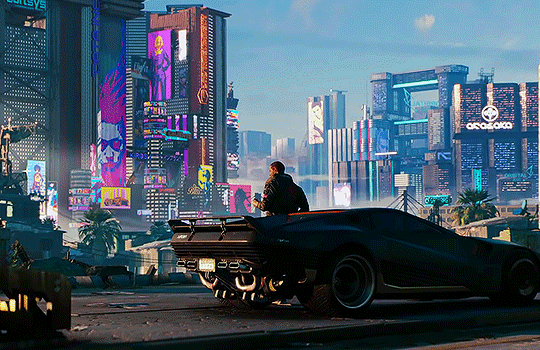
Cont. My solution is to create a hybrid proposal somewhere between cyberpunk and solarpunk; a city that presents like solarpunk, but that has achieved this green, sustainable self-expression without renouncing its colonial and capitalist exploitation of vulnerable peoples and environments elsewhere. Essentially, this would make the city the large-scale equivalent of one of those high-end clothing brands that have "recycled" symbols on their tags, but that have their product made in deplorable overseas sweatshops. The message of the novel would, thus, be amplified to include the idea that there can be no environmental justice without social justice. Does it work? We'll see. That's what I've got so far.
Researched the Link between Colonialism, Environmental Catastrophe and Capitalism: To educate myself on the main themes of the novel and how these can be better incorporated into the setting, I picked up Chaos in the Heavens: The Forgotten History of Climate Change by Jean-Baptiste Fressoz & Fabien Locher, and translated by Gregory Elliott. And let me tell you, I was not expecting to learn what I learned!!! This book is honestly fire. I had no idea climate science was so deeply rooted in colonialism!! Honestly, more than any other book I've read so far, Chaos in the Heavens articulates the link between the three main themes I've been trying to work with so, so clearly. Now I understand why people say we're lazy because we get too much sun. Or why all the native trees got cut down and replaced with pines. Eye-Opening!!! 100000% recommend.
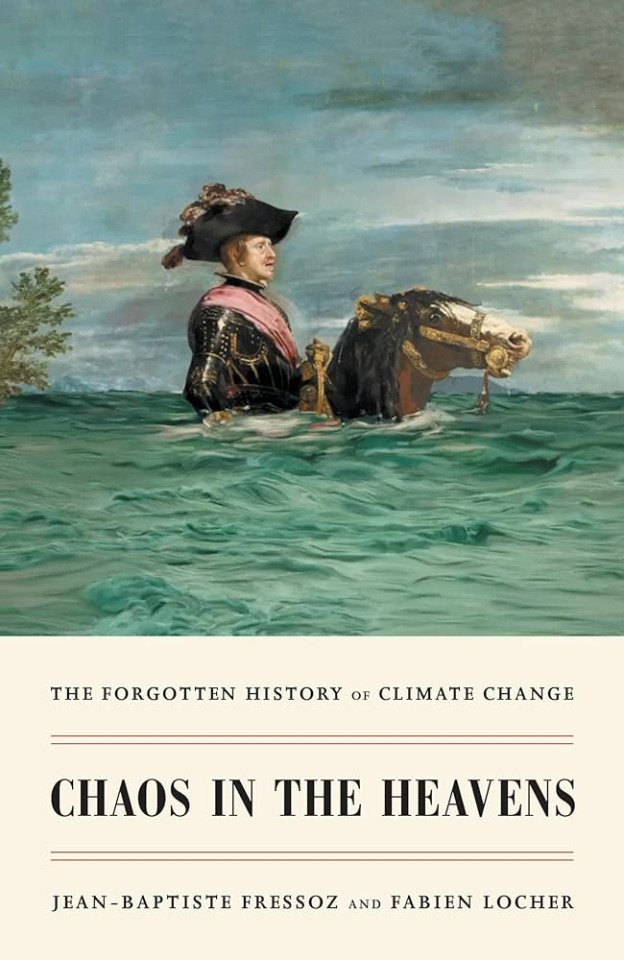
REMINDERS:
Answer pending asks, and publish that promised worldbuilding post on the geography, flora & fauna of The Sorcerer’s Apprentice universe, you know the drill lol
Research Transhumanism.
Research Designs for Sustainable Cities and New Green Technologies.
TAG LIST: (ask to be + or - ) @the-finch-address @fearofahumanplanet @winterninja-fr @avrablake @outpost51 @d3mon-ology @hippiewrites @threeking @lexiklecksi @achilleanmafia @blind-the-winds
© 2024 The Sorcerer’s Apprentice. All rights reserved.
#writeblr#writeblr community#writblr#writers of tumblr#writers on tumblr#original fiction#wip#writing community#writblr community#writing#progress update#biweekly progress update#colonialism#solarpunk#cyberpunk#fiction#sci fi and fantasy#am writing#book writing#my writing#novel writing#creative writing#writers on writing
13 notes
·
View notes
Text
I think I might have had a bit of a revalation this fine morning.
Last night, @horizonproblems and I attended this truly amazing talk in a public lecture series on Star Trek that my uni is hosting this term. (It was all about the Third Age of Star Trek and some very valid, nuanced perspectives on hope and optimism and writing utopias under neoliberal capitalism and it was just... amazing. But that's not the point right now XD)
Afterwards, we chatted with the presenter about "Trekademia" (I love that concept so much!). I mentioned I'd seen the call for papers/talks for this lecture series that went out over a year ago (I was working for the English dept. at the time), but I never applied, because the only remotely Trekademic writing I'd ever done was my in-universe essay on holo-sentience and holographic food "The Cake is a Lie". And he asked me to send him a link, even though I never managed to finish writing and it's essentially missing the most interesting section.
But I took the opportunity to reread what I have posted and then look through my WIPs and I realized something: One of the reasons I think I was never able to finish writing the findings section of this "paper" is because I had So Many Ideas that I wanted to weave in. So many little moments with the holos, so many character facets and worldbuilding snippets. And it doesn't work with the extremely academic tone I'm going for.
And after sleeping on it, it occurred to me: I can still post all the outtakes that don't make it into the actual paper! I can keep the tone and focus of that essay and cut out any extraneous bits that don't work in that fram -- and then post a separate work that's like... the researchers field notes or something, where I put aaaalll the little details that didn't make the cut of the official writing!
It will be in bullet points and disconnected and self-indulgent as all heck -- but I'm sure there will be at least a handful of people out there apart from me who would still enjoy that particular take on various holo-headcanons. And even if I'd only be writing it for me, that would still be allowed!
So, no promises that anything might happen, but I just wanted to put it out there as a reminder to myself, if nothing else. Being deeply attached to your ideas and self-indulgent bits of writing is allowed! And even if you need to cut them from the concrete story you're trying to tell because they hurt the pacing or structure or tone, that doesn't mean you have to completely abandon them. There are always ways to share your outtakes and additional notes, on AO3 or tumblr or Discord or whatever, and you're always allowed to share them. Even if nobody but yourself will get a kick out of them, you're still allowed!
(And chances are, somebody else will be interested in reading your rambling thoughts and delighted to find them, actually.)
#lili's writing adventures#the cake is a lie#and my undying hope that one day i'll be able to finish it#THERE IS STILL AT LEAST HALF A PAGE OF BIBLIOGRAPHY I HAVEN'T SHARED YET!!!#i am *so fucking proud* of that bibliography#and can't stop laughing at all the jokes past!me put into it#academic pastiche so earnest you can't tell if it's pastiche or not is *my shit* 🤣😂#though my brain *is* toast and has been for quite a while#so no promises#having a weekly lecture on a wild array of Trek topics is really helping with the motivation and inspiration though
8 notes
·
View notes
Text
Some argue that these days, it hardly matters anymore who you vote for. Though we still have a right and a left, neither side seems to have a very clear plan for the future. In an ironic twist of fate, the neoliberalist brainchild of two men who devoutly believed in the power of ideas has now put a lockdown on the development of new ones. It would seem that we have arrived at “the end of history,” with liberal democracy as the last stop and the “free consumer” as the terminus of our species. By the time Friedman was named president of the Mont Pèlerin Society in 1970, most of its philosophers and historians had already decamped, the debates having become overly technical and economic. In hindsight, Friedman’s arrival marked the dawn of an era in which economists would become the leading thinkers of the Western world. We are still in that era today. We inhabit a world of managers and technocrats. “Let’s just concentrate on solving the problems,” they say. “Let’s just focus on making ends meet.” Political decisions are continually presented as a matter of exigency – as neutral and objective events, as though there were no other choice. Keynes observed this tendency emerging even in his own day. “Practical men, who believe themselves to be quite exempt from any intellectual influences,” he wrote, “are usually the slaves of some defunct economist.” [...] People now doubt that “human ideas and beliefs are the main movers of history,” as Hayek argued back when neoliberalism was still in its infancy. “We all find it so difficult to imagine that our belief [sic] might be different from what they in fact are.” It could easily take a generation, he asserted, before new ideas prevail. For this very reason, we need thinkers who not only are patient, but also have “the courage to be ‘utopian.’” Let this be the lesson of Mont Pèlerin. Let this be the mantra of everyone who dreams of a better world, so that we don’t once again hear the clock strike midnight and find ourselves just sitting around, empty-handed, waiting for an extraterrestrial salvation that will never come. Ideas, however outrageous, have changed the world, and they will again. “Indeed,” wrote Keynes, “the world is ruled by little else.”
Rutger Bregman, Utopia For Realists: And How We Can Get There
5 notes
·
View notes
Text
just got an ask and am not going to answer it directly because half of it was rambling about a movie unconnected to the point i was making about barbie and oppenheimer and which I have not seen and will not see
but I do feel like I should clarify what I mean by "desire" because it's not just sexual desire. it is sexual desire, but it's also desiring anything, wanting things, a wanting which both requires and bestows agency (of a sort) — something that "Everyone is Beautiful and No One is Horny" gets at well, which is the different between "beauty" as being an object of idealization, and "horny" as a human instinct, of hunger and attraction and the ability to want someone or something earnestly and honestly
obviously it's not all about sex. I'm ace! I get that! I'm not saying "barbie has to have sex for this to be a good movie" because that would be stupid lmao. but a movie in which desire, of any kind, is absent, functionally negates a major motivating factor of any real human's behavior: we all want things. we all desire things.
the thing is: there aren't actually a great mass of movies about women being horny, because movies about women who have sex or are defined by their relationship to sex usually aren't actually about women wanting sex. can anyone name three movies made in the past 5-10 years about women being horny? I'm not sure I can, especially if we're not counting the "raunchy sex comedy" genre
but that's not entirely germane to my point because my observation about Barbie doesn't stem from "barbie doesn't want to have sex," it stems from "barbieland purports to illustrate a utopia in which barbies don't have to (or get to) want anything"
again, none of this is me saying "barbie is a bad movie and you're a bad person for liking it," it's just an observation about the way neoliberalism has devalued desire to the point that two films with such immense cultural impact have this weird abnegation of desire-as-a-structuring-force in common
#this is where I could get into the andrea long chu stuff but I'm not putting that on tumblr in a random post bc I KNOW someone who hasn't#read andrea long chu WILL take it in bad faith and get mad lmao
11 notes
·
View notes
Note
I remember way back in 2008 a reporter not even for FOX talking totally straight faced about "would generals, or foreign leaders, respect Hillary Clinton because she was a woman? would American military leaders really be comfortable taking orders from her?" and again this wasn't some right wing Republican rag but like a mainstream reporter who was "just asking the question" there was then a delightful back and forth about Hillary the nuclear button and "that time of the month!" (never mind she was like 60 at the time)
which is just.... why its important that women rise to the highest levels of the military and the face of military power stop being exclusively male
and also they sound like sexist assholes from the Bush years, no matter how you try to drag it up as progressive, they're just saying women aren't "allowed" to have power till we reach a fictionalize utopia Barbie world were all power is innocent and no one gets hurt, then the girls will be allowed to play, but till then stay in the kitchens gals!
Like maybe it's the shitlib centrist fandom democrat neoliberal warhawk in me, but I feel like the more we have women (and other historically underrepresented groups) present at the tables and in positions of power and influence, and using their experiences and talents in those roles, the better.
Otherwise the alternative is the horribly unrepresentative and dangerously limited status quo.
10 notes
·
View notes
Note
Do you have any good books/sources for combating marxist arguments? I'm in a course where we have to contrast capitalism and freedom and our professor has assigned all marxist writers (except for one essay from a Neoliberal) who critique all private property/capitalism and I feel exceptionally unprepared because I am NOT knowledgeable on politics or economics.
On one hand I feel for the case marxists make but I'm just so suspicious that it would ever work out in real life much less applied to our modern society? If communism is so great why has literally every communist country train-wrecked yknow? I come from an immigrant fam and this country has honestly transformed us in 3 generations top and I 100% understand the inequality but also there seems to be a lot of good opportunity compared with former USSR countries. I'm not saying things are perfect just that I'm skeptical of the proposed "solution".
(I'm a lost stem girl and they're making me take this for English)
I sort of get what you mean.
One of the main arguments against Marxism is that capitalism is the worst economic system for women other than every other economic system. The patriarchy is universal, there's no society in the world that isn't patriarchal (and no I'm not making exceptions on this statement for tiny 100-person communities in Papua New Guinea that for the record, are still patriarchal because it's only the WOMEN who are forced to carry babies, and pregnancy is and always has been dangerous for the mother even though it's obviously way better than 200 years ago).
Look at it like this: in India, I am not the victim of racism but I'm still victimized by misogyny, this isn't a complicated statement! Chimamanda Ngozi Adichie said this same thing about Nigeria, that in Nigeria, she wasn't perceived as African-American but she was still subject to cultural misogyny since that didn't go away.
Like also, sure, a communist utopia sounds great in theory for everybody is equal economically but who's going to enforce that? Won't they be in positions of power if they have the ability to enforce that? Also, in a communist utopia, who's going to make sure that people don't commit violent crime? Like, are people really claiming that rape is caused by poverty because think long and hard about what that statement implies. Rape is the oldest crime known to humanity, there are accounts of it in ancient times! And for the record, rapists WERE censured even before the modern era, even if obviously, there were varying definitions of rape, marital rape wasn't a crime like it is today etc.
But yeah, I don't fully understand the economic arguments for and against it, but those are just off the top of my head.
7 notes
·
View notes
Text
old about pinned post
Hello there! Under the cut you'll find info about my goals for this blog and myself, how I run this blog, and a list of my writing.
My goals for this blog:
Identify trends among "the left" which I think are a manifestation of neoliberal logics, and provide suggestions on how to resist these tendencies and refocus on real left values
Raise awareness of neoliberalism as not just a set of economic policies, but as an ideology that intentionally aims to change the way people think about themselves and the world, pushing them towards right wing values
About me:
I have been on/off involved in left activism, including on Tumblr, for well over a decade. One of the most pressing problems I have observed, which I don't think gets enough attention, is not just the tendency of concepts borne from real left values to become recuperated into liberal capitalism, but the tendency of ostensible leftists to continue pushing those diluted concepts in often damaging ways.
I have done a great deal of research into criticism of left activism from a left perspective, but it is scarce. Many seemingly promising texts turn out to be secretly right wing and shallow in their analysis. I want to discuss problems in left activism and society generally from a perspective that is deeply rooted in leftist values instead of falling into the trap of complaining about whatever the current right wing boogeyman is.
This is a place for me to gather and share my thoughts on this topic. Because of my own experiences and the high stakes involved in left activism, I firmly believe that neoliberal ways of seeing the world, the self, and other people must be identified and eradicated.
My approach:
I always ask myself how a problem would be solved or a difficult interaction navigated in my ideal utopia. I aim to keep myself grounded in my values and make decisions from a place of being in line with my values. When I am not able to make decisions from such a place, I will step away from a discussion.
I always ask myself who my rhetoric and actions serve. I aim to build solidarity. This is because "divide and conquer" has always been an effective tactic against the left and we must resist that. I believe we can recognize our differences and set boundaries with people who don't share our values without actively fomenting negative feelings.
I will resist all tendencies to police other people's behavior or make them prove their morals. I don't think a community in which people feel morally surveilled and afraid to commit infractions for fear of social punishment is a healthy one. I aim to eradicate traces of Puritanical morality in my thinking. I will not self monitor and alter what I say based on how it will be received.
I will conserve my time and energy by rejecting the obligation to respond to everyone who engages with my writing. I will not engage with bad faith commenters, but if I can, I will try to respond to others.
My writing:
shareholder primacy is why everything is getting worse
neoliberalism isn’t just a set of economic policies
sensitivity readers and the privatization of morality
2 notes
·
View notes